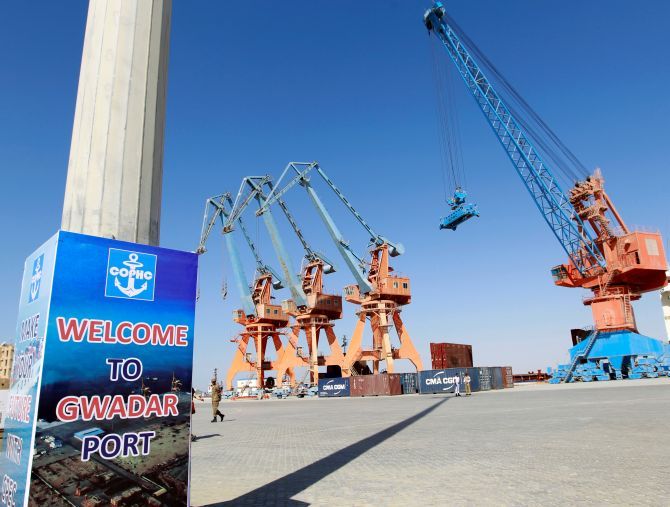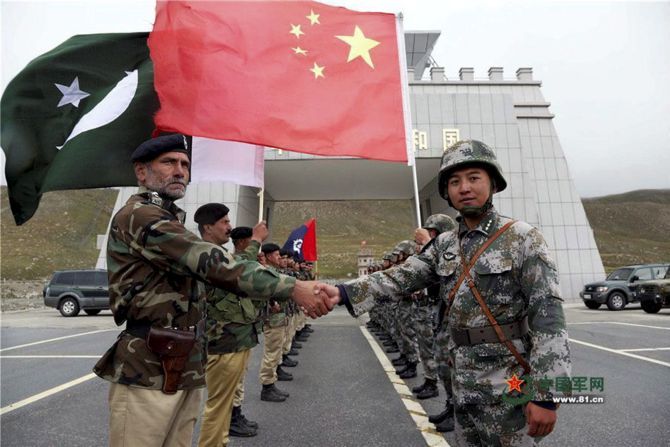'The separatist resurgence in Balochistan is thwarting Pakistan's plans to build CPEC projects to optimally utilise Balochistan's energy reserves,' points out Brigadier Gurmeet Kanwal (retd).

The China-Pakistan relationship has been labelled by the leaders of both counties as an 'all-weather friendship'. It has been variously described as being 'higher than the mountains', 'deeper than the oceans', 'stronger than steel' and 'sweeter than honey'.
The two countries have colluded in developing nuclear warheads and ballistic missiles. They also cooperate closely in manufacturing military hardware. Most of Pakistan's weapons and equipment now come from China.
The relations between the two have warmed up even more with the China-Pakistan Economic Corridor (external link) beginning to take shape.
Together the two countries have been assiduously wooing Afghanistan, Iran and Russia to join the CPEC for mutual benefit. India opposes the CPEC as the project is being built through disputed territory in Gilgit-Baltistan and Pakistan occupied Kashmir.
The $62 billion CPEC project will provide rail and road connectivity between China's Xingjiang province and Gwadar port on the Makran coast in Balochistan. China is extremely concerned about the safety and security of its workers engaged in construction, particularly those working on infrastructure projects located in Balochistan.
Balochistan is Pakistan's largest province, but has the lowest population (13 million) and is the least developed. The Baloch people never quite accepted the forcible merger of their province with Pakistan soon after independence from the British in 1947.
Since then, there have been several uprisings in Balochistan. The current struggle of the Baloch people against Pakistani subjugation dates back to 2005.
The ethnic Baloch people say they have been marginalised by the government and deprived of their rights (external link). Thousands of people have been apprehended by the Pakistan army and police forces; many of them have gone missing.
Pakistan has for long accused India of supporting and financing the insurgency in Balochistan. However, the Baloch nationalists, who seek a greater share in national resources and more internal political and administrative autonomy, deny such allegations.
They believe that Pakistan uses the cliché of foreign involvement in Balochistan so as to divert attention from the real challenges confronting the Baloch people.
While India has had traditional linkages with the Baloch people and most Indians sympathise with their plight, India does not provide material help to the Baloch uprising. Indian support for the Balochistan Liberation Army that is fighting for an independent homeland for the Baloch people is limited to the expression of sympathy.
Prime Minister Narendra Damodardas Modi had publicly expressed support for the Baloch people during his Independence Day speech in August 2016. This was welcomed by the Baloch people and the Baloch Diaspora.
Suddenly, the long-festering Baloch uprising took centre stage in world capitals with demonstrations being held in London to protest Pakistan's brutal occupation, including several outside the Chinese embassy to demand the cancellation of plans for the CPEC.
Demonstrations were also held in Berlin, Leipzig and Munich in Germany to showcase the Baloch cause for independence and to thank the Indian people for their support.
Thanking the Indian PM for his words of encouragement, Khalil Baloch, chairman of the Baloch National Movement, said (external link) in a statement in Washington, 'The Baloch nation hopes that the United States and Europe will join Prime Minister Modi and hold Pakistan accountable for the crimes against humanity and the war crimes it has committed against the Baloch nation in 68 years of its occupation of Balochistan and during the five wars that the Baloch nation has fought with Pakistan to win its national freedom.'
According to Nawab Brahumdagh Bugti, head of the Baloch Republican Party, 'Balochistan is burning since the forceful occupation of the state in 1948. Since then, five major long-drawn military operations have been launched by the armed forces of Pakistan; the latest of them is still continuing.'
'During this period of 66 years, Balochistan has suffered from gross human rights violations (external link) by the Pakistani forces which have been getting worse and accelerated with the passage of every single day,' Nawab Bugti said.
Five years ago, Bugti said, '140,000 Baloch had been killed and at least 20,000 Baloch are missing since 2006.'
For over six decades, Pakistan has exploited the rich mineral resources of Balochistan extensively. The government of Pakistan does not pay them any royalty (external link) or give them what they consider their due share of the revenues generated from the mines.
Due to the lack of transmission lines, electric supply to Balochistan is the lowest of all the provinces. Balochistan continues to remain the least developed province of Pakistan and poverty is rampant, leading to a sense of deep resentment among the people.
The separatist resurgence in Balochistan is thwarting Pakistan's plans to build CPEC projects to optimally utilise Balochistan's energy reserves. It is also hampering efforts to build trans-national gas pipelines from Iran and Turkmenistan -- with the potential to generate royalty worth $700 million to $800 million annually.
Accepting responsibility for an attack on construction workers (external link) near Gwadar in which 10 labourers died in May 2017, Jeander Baloch, the BLA spokesperson, said in a statement, 'This conspiratorial plan (CPEC) is not acceptable to the Baloch people under any circumstances.'
'Baloch independence movements have made it clear several times that they will not abandon their people's future in the name of development projects or even democracy,' Baloch added.

Pakistan is raising (external link) a Special Security Division comprising approximately 15,000 personnel to (external link) provide security for the CPEC against terrorist attacks.
Though the raising and maintenance of this force will considerably drive up the cost being incurred by Pakistan on the CPEC, it is unlikely to be able to provide an acceptable degree of security because of the diversity of threats.
The Chinese engineers involved in the construction of dams in Gilgit-Baltistan had repeatedly asked for People's Liberation Army soldiers to be inducted for security.
Such a development in the case of the CPEC -- that is, the presence of PLA personnel in Pakistan in large numbers -- will further vitiate the security environment in South Asia.
An impression that is rapidly gaining currency in Pakistan is that the benefits of the CPEC will accrue mainly to the Chinese.
Also, there are increasing misgivings within Pakistan regarding the long term debt that the huge investment in the CPEC will result in.
The Pakistani elite are watching carefully as more and more nations pull out from various projects. Of particular concern is the debt trap that the construction of Hambantota port and international airport has proved to be for Sri Lanka.
Brigadier Gurmeet Kanwal (retd) is a former Director, Centre for Land Warfare Studies, New Delhi.









